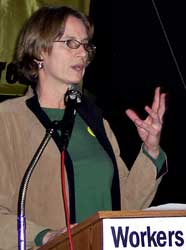Study to change the world
Published Nov 30, 2007 7:44 PM
|
Phebe Eckfeldt
WW photo: John Catalinotto
|
A speech by Workers World Party National Committee member Phebe
Eckfeldt to the WWP National Conference on Nov. 17-18, 2007.
We are all here today because we want to help change the world, make it a
better place. How are we going to accomplish that?
One very important way is to study. We need to continuously develop ourselves
politically.
If you are traveling to a destination, you need a map, you need to read and
study a map to figure out how to get there. If you want to make a revolution
you need to study the works of revolutionaries and you need to study history.
These are maps or guides
Marxism-Leninism is like a map. It is a guide for action; you can alter your
route according to conditions on the road. Marxism is an objective way of
looking at the world and understanding it.
Marxism takes an individual or specific development and connects it to what is
going on in society as a whole. Marxism explains the world as no other system
of political thought can. It shows in general terms how the world can be
changed–that is, it explains the material basis for class struggle.
A young Black man caught up in the clutches of racial profiling and police
brutality will find answers about why this is happening to him in Lenin’s
“The National Question and Self-Determination,” and also in
“Marxism, Reparations and the Black Freedom Struggle” edited by
Monica Moorehead.
A woman stitching clothes 12 hours a day in Indonesia can discover in
Marx’s “Wage Labor and Capital” the economic laws that drive
the bosses to squeeze every drop of profit from her unpaid labor.
A young mother in an abusive relationship can discover that it is not she who
is to blame, but that women’s oppression is built into the capitalist
system, by reading Engels’ “The Origin of the Family, Private
Property and the State.”
Marxism is a guide for action.
In Boston when we were working on the case of the Somerville Five–five
Black youth racially profiled, brutalized by police and framed up, we used the
book, “Marxism, Reparations and the Black Freedom Struggle” as our
guide. We studied it, poured over it, discussed it, applied the lessons to this
case. It gave us the tools to conduct and analyze this struggle against
racism.
When I was first introduced to Marxism in college, I knew quite quickly that
this was the lens through which I wanted to view the world. Marxism looked
right to me, it sounded right, it smelled right, it felt right. It matched the
world I saw and experienced.
Marxism is empowering!
The three things that I learned right away through Marxism were that: Women
have not always been oppressed and exploited. We are part of a worldwide class
of workers. And that capitalism is a temporary phase in the history of social
development that will inevitably be replaced by a higher, humane system of
socialism. How empowering is that?
Many poor and working people may feel intimidated by the mention of studying
economics or history—and justifiably so. Workers are told that we cannot
understand economics or can’t understand the words or concepts or
vocabulary contained in Marx or Lenin.
That’s a bunch of lies. They tell us that because they are afraid we will
study Marxism and use it to change the world! Instead they hold up places like
Harvard as the standard for education.
What kind of education is this? It is bourgeois indoctrination.
I work at Harvard. Recently a former Harvard professor named James Watson, who
was the co-discoverer of DNA and won a Nobel Prize for it, published a book
where he states that African American people are genetically inferior! This
followed the former president of Harvard implying that women were inferior to
men. This is the ideology the top scholars at Harvard taught to the future
members of the ruling class.
This is the ideology that keeps us divided and powerless to change anything.
This is what we are fighting against.
So, let’s read, let’s study. Let’s take a beautiful and
riveting document like Fred Goldstein’s upcoming book and read it line by
line and talk about it and interpret it and tear it apart and digest it and
turn it into action.
Let’s study our history. The history of working and poor and oppressed
people is alive; it is emotional, glorious, painful. Not dry and dead like how
it is taught in elementary and high school. Our history brings us to tears, it
makes us want to stand up and shout, it makes us want to fight.
Let’s be like Che Guevara, who encouraged his fellow workers and comrades
by telling them that at the end of a long day of working at a difficult and
tiring job, go home, open up a book and study for one hour—and you can
change the world.
Articles copyright 1995-2012 Workers World.
Verbatim copying and distribution of this entire article is permitted in any medium without royalty provided this notice is preserved.
Workers World, 55 W. 17 St., NY, NY 10011
Email:
[email protected]
Subscribe
[email protected]
Support independent news
DONATE


